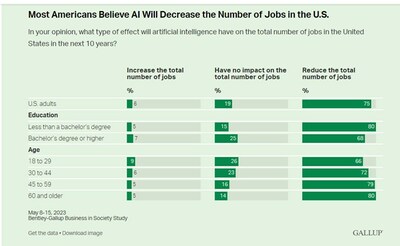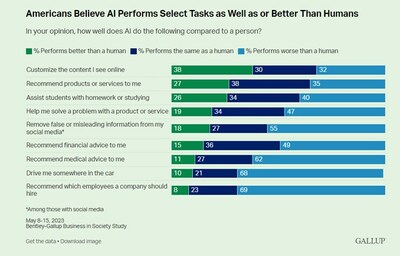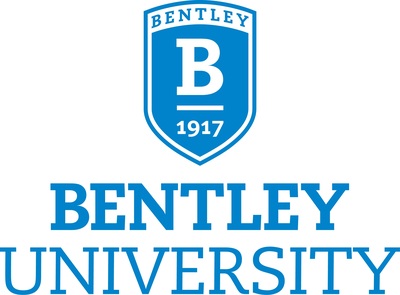Bentley-Gallup Research Shows that Three in Four Americans Believe AI Will Reduce Jobs
Press Releases
Sep 14, 2023
WALTHAM, Mass., Sept. 14, 2023 /PRNewswire/ — Most Americans think artificial intelligence (AI) will negatively affect the U.S. job market, with 75% saying it will decrease the total number of jobs over the next 10 years. About one in five (19%) believe AI will not affect the number of jobs, while 6% say it will result in an increase in jobs.
U.S. adults with less than a bachelor’s degree are more likely than those with a bachelor’s degree or higher to say AI will decrease the number of jobs (80% vs. 68%, respectively). Younger Americans are less pessimistic than their older counterparts about AI, with two-thirds of adults aged 18 to 29 saying it will decrease the total number of jobs, compared with 72% of 30- to 44-year-olds, 79% of 45- to 59-year-olds, and 80% of those aged 60 and older.
Results for the Bentley-Gallup Business in Society study are based on web survey responses collected May 8-15, 2023, from 5,458 U.S. adults in Gallup’s nationally representative panel.
Majorities Say AI Performs Certain Tasks as Well as or Better Than Humans
While Americans are pessimistic about AI’s potential impact on the job market, they recognize the benefits AI could bring in some areas. In particular, majorities believe AI performs as well as or better than humans at customizing the content users see online (68%), recommending products or services to them (65%) and assisting students with coursework (60%).
Across all nine tasks included in the study, Americans are the least positive about AI’s ability to recommend which employees a company should hire, its self-driving capabilities and its ability to recommend medical advice. About two-thirds of Americans believe AI performs worse than humans on each of these tasks.
Most Americans Lack Trust That Businesses Will Use AI Responsibly
When asked how much they trust businesses to use AI responsibly, a majority of Americans, 79%, say “not much” or “not at all.” Another 21% report they trust businesses “a lot” or “some.”
Trust is consistently low across subgroups of the U.S. adult population, including by age, gender and race/ethnicity.
Few Think AI Does More Good Than Harm
Although many Americans think AI can perform as well as or better than humans in completing particular tasks, they are generally negative about the amount of harm it can cause. Forty percent of U.S. adults think AI does more harm than good, and half say it does equal amounts of harm and good. Just 10% of U.S. adults believe it contributes more good than harm.
Notably, Black and Asian Americans have a more positive view of AI’s impact on society: 71% of Asian and 67% of Black adults say AI does more good than harm or equal amounts of harm and good, compared with 60% of Hispanic and 59% of White adults.
Implications
AI represents an unprecedented opportunity for businesses as they seek to evolve, become more efficient, and innovate in the products and services they offer customers. And yet, most Americans are wary about the overall impact of AI on the job market. Still, there are select tasks that U.S. adults believe AI can do as well as, if not better than, humans who have traditionally performed these tasks, suggesting consumers see a place for AI. This optimism is higher among younger people, who are more likely than their peers to believe in the future of AI.
Still, businesses have work to do to affirm their commitment to using this tool as a force for good in their internal processes and in connecting with their customers. It is important to keep in mind that artificial intelligence is still unknown to or misunderstood by many Americans. This knowledge deficit may explain the lack of confidence people have in using it for certain tasks and their lack of trust in businesses to use it responsibly.
Survey Methods:
The Bentley-Gallup Business in Society study is based on a Gallup Panel web survey completed by 5,458 national adults, aged 18 and older, conducted May 8-15, 2023. The Gallup Panel is a probability-based longitudinal panel of U.S. adults whom Gallup selects using random-digit-dial phone interviews that cover landlines and cellphones. Gallup also uses address-based sampling methods to recruit Panel members. The Gallup Panel is not an opt-in panel. The sample for this study was weighted to be demographically representative of the U.S. adult population, using the most recent Current Population Survey figures.
For results based on this sample, one can say that the maximum margin of sampling error is ±1.8 percentage points at the 95% confidence level. Margins of error are higher for subsamples.
In addition to sampling error, question wording and practical difficulties in conducting surveys can introduce error or bias into the findings of public opinion polls.
Learn more about how Gallup Panel works.
CONTACT:
Helen Henrichs
[email protected]
![]() View original content to download multimedia:https://www.prnewswire.com/news-releases/bentley-gallup-research-shows-that-three-in-four-americans-believe-ai-will-reduce-jobs-301928338.html
View original content to download multimedia:https://www.prnewswire.com/news-releases/bentley-gallup-research-shows-that-three-in-four-americans-believe-ai-will-reduce-jobs-301928338.html
SOURCE Bentley University






